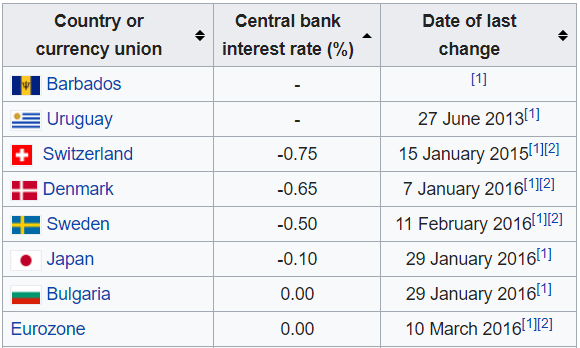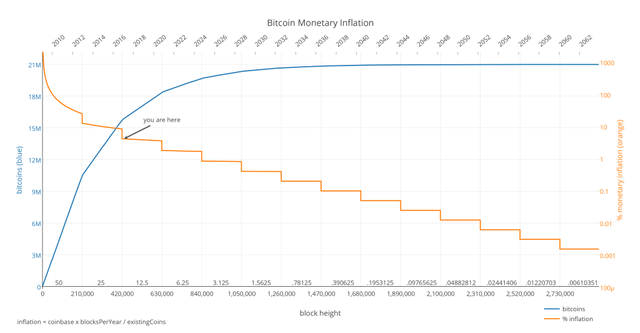Negative Interest Rates
If you haven’t noticed, something incredible is going on right now. There are a handful of countries with negative central bank interest rates, just look below:

Let this sink in for a second. With a -0.75% interest rate, if you deposit $100 into a bank you’ll have $99.25 at the end of the year. Now, why would anyone take that deal? The simple answer is – there is no safe haven for money.
Negative interests rates are a carryover from the 2008 financial crisis. The subsequent bailouts swelled government debt to $58 trillion, from $33 trillion….a rise of 75%! The financial crisis led to the great recession, which left a number of advanced countries with low growth and low levels of investment and inflation. The solution? Coerce people into investing their hard earned savings by effectively taxing cash.
Let’s take look at the current financial picture of some classic investments.
U.S. Treasuries
Low central bank interest rates result in low Government Bond interest. A 1 year U.S. treasury currently pays 1.31%. Now, it’s not uncommon for U.S. Treasuries to pay low interest rates as these financial instruments are some of the safest bets around. However, faith in U.S. Treasuries is diminishing as the Federal Reserve continues to print new money and the U.S. Congress continues to ignore the federal debt ceiling.
In addition to historically low interest rates, we have an interesting phenomenon going on – the flattening of the Treasury yield curve.

Usually investors get paid a premium for locking up their money in a bond for extended periods of time, and you can see that premium in the form of higher interest rates for 30 year treasuries. However, if you look towards 2017, you’ll see the interest rates start to converge, eliminating some of the perks of longer-term bonds. While we’re not quite at an inverted yield curve, this is typically a troubling sign for bond markets.
On a smaller scale, Puerto Rico defaulted on their bond payments this year. This was a big blow to institutional and wealthy investors, as Puerto Rican bonds enjoy triple-tax free earnings, a big deal when you’re a Billionaire. Most of these bonds were insured, and unlike AIG during the financial crisis, the bond insurance companies look like they have enough money to pay out. However, many insurance companies do not have the reserve to pay out if an even slightly bigger default were to happen.
The Stock Market
So, how about the stock market? Is that a safe place for your money? Well, a lot of economists think we’re entering bubble territory. While this is particularly true in many sectors, even the S+P 500 is starting to look dangerously overvalued. Take a look at the Shiller PE Ratio, an inflation-adjust price to earnings ratio:

Oh my! we’re at Black Tuesday territory. The market is a little swollen right now.
Currencies
There is a hyper-inflation crisis going on in Venezuela. Since Nicolas Maduro took over from Hugo Chavez in 2013, the Venezuelan Bolivar has lost 99.81% of its value. Inflation is so bad that Venezuelans are forced to weigh their money instead of counting it. Many Venezuelans don’t know if they’ll have enough money for bread tomorrow, because they have no idea what the price of bread will be.
Hyper-inflation is not unique to Venezuela, and is a lingering result of the 2008 financial crisis. Argentina, which seems to default every 10 years or so, is also experiencing record inflation, just look at the exchange rate to the U.S. Dollar

Here’s a look at the top inflation rates around the world:

Compare this to Bitcoin’s current inflation rate of 4%, which is the percentage of new coins mined per year as defined by Bitcoin’s mathematically per-defined limits. 4% inflation places Bitcoin within the top 20 currencies with lowest inflation. Better yet, the amount of new bitcoins goes down over time, eventually leading to a hard-cap of 21 Million coins:

Conclusion
These are uncertain financial times. The stock market is overvalued, bonds pay next to nothing, and many currencies are becoming obsolete. The world is continuing to feel the pain from the 2008 financial crisis. Printing money has consequences, and the fractional reserve system used by many countries will undergo many stress-tests in the near future.
I have faith that our great economic leaders will find a solution. However, I’m hedging my bets by holding some Bitcoin. I suggest you consider doing the same.
Please check out my website, https://www.bitconsult.co
bitconsult has a great getting started guide and a lot of in depth bitcoin and finance information!
contact us to set up one on one or group consultation, special rate for steemit members!
with crypto currencies you make a lot of money. i follow you now. thanks for sharing, nice post!
If you like my Posts, just Follow me and Resteem and Upvote my Posts. @thunderland
Downvoting a post can decrease pending rewards and make it less visible. Common reasons:
Submit
thanks for the read. It's really hard to set price targets for bitcoin, so I like to look at potential markets. There's certainly money flowing in from offshore accounts and the wealthy, as there are very few safe havens. However, investing in a brand new currency is inherently risky! I usually suggest people invest 5-10% of their assets once they understand the volatility.
Downvoting a post can decrease pending rewards and make it less visible. Common reasons:
Submit
Nice research :) I will follow you
Downvoting a post can decrease pending rewards and make it less visible. Common reasons:
Submit
thanks! your content looks good too! will follow
Downvoting a post can decrease pending rewards and make it less visible. Common reasons:
Submit